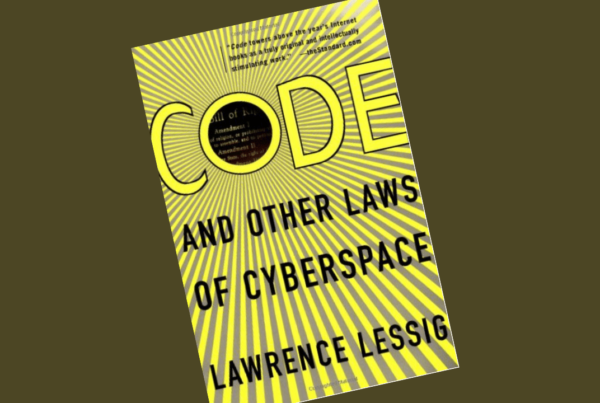When I was five years old my parents announced they were getting a divorce.
I was displeased, to say the least. None of my schoolmates had divorced parents. None of them had manic-depressive mothers either (as far as I could tell).
My mom got custody of my younger brother and me, and she tried to keep her mania under control during the ensuing custody battle. She was a wonderful mom 90% of the time.
But when she was depressed it was like being on the set of a movie like The Exorcist. When her demons escaped they became everyone’s demons.
Not surprisingly, I didn’t do very well in school. I didn’t do any of my homework assignments, and I struggled to up in class. I excelled at secretly reading books under my desk, and daydreaming.
Math was particularly challenging. There was no hiding one’s ineptitude. A wrong answer equaled complete failure, and there was no reward for effort.
Somewhere along with way I decided that keeping up with math was impossible, so I gave up completely.
When I started my senior year of high school I was living in Panama (my mom had moved back to her home country when I was starting ninth grade). My brother and I were placed in a Panamanian school where all the classes were mandatory; there were no electives.
And the high school math there was exceptionally challenging: Advanced Algebra, Analytic Geometry, and Calculus.
In our senior year we had to take Physics, which presumed knowledge of the aforementioned math subjects. That’s when I knew I was in serious trouble.
The first day of class the Physics teacher had us go to the blackboard to solve some math problems just to test our proficiency; I did poorly, as expected. The professor was gruff, and said he wouldn’t hesitate to flunk a senior who couldn’t do the work.
A few weeks later he developed a serious medical condition and had to be replaced.
Then one day a tall dark-haired fellow named Ernesto Regales showed up to teach Physics. He too had us work some equations at the board while he quietly watched.
When I told him I couldn’t work the problems, he smiled in a weird way. He patiently urged me to work on the easy problems in the front of the textbook chapter. I nodded appreciatively, as if I was going to follow his suggestion.
Of course, I wasn’t. I had long ago given up on math.
Then it was time for our first exam. It involved solving a bunch of problems like this one: ‘Boat A is traveling North at 15 miles per hour and Boat B is traveling West at 7 miles per hour; at what speed are the two boats moving away from each other?’
These problems were exactly like the ones we were supposed to solve at the blackboard.
Apparently, the problems involved using the Pythagorean theorem. I had a sense there was some kind of formula for solving these problems, but I didn’t know what the formula was or how it worked.
So, when I looked at the problems on the test I knew it would be impossible to solve any of them. I waited until one of the genius students turned in her test, to minimize the chance that the professor would look at my test and see it was completely blank.
I handed in the test and spun away.
Just as I got to my desk Professor Regales asked me to return. He was looking at me with that same weird gaze.
I had already figured out that he was a religious nut. I realized this as soon as he announced we’d all have to pray before taking our exam.
He delivered his prayers with an intensity I’d never witnessed before. He’d close his eyes tightly, then enter a solemn rapture as he spoke softly to God, beseeching him to give us strength and grace.
I felt like he actually expected God to help us if he prayed hard enough.
So there he was with that spiritual gaze, encouraging me to spend whatever the time I had remaining to solve the boat problems. His expectations were unrealistic, but his concern seemed genuine. So, I found myself in a quandary.
I didn’t want lie to him. I confessed I had not learned the formula and did not know how to use it even if he gave it to me.
He was unmoved by my confession.
“Well, maybe there’s a way if you just sit and think about it,” he said.
Professor Regales was so confident, even after my blunt confession, I figured he was going to give me the formula out of pity. “No,” he said, “but if you find a way that’s valid I’ll give you credit for figuring out how to approach the problem.”
That was a shock.
Getting credit for something other than a correct answer on a math test? I’d never heard of that before.
I plopped down in my desk and tried to figure out what was going on. What exactly was this odd teacher expecting me to do? Surely, he didn’t believe I was going to derive the formula on my own, right?
Every time I looked over at him he’d smile beatifically. I was convinced there was some obvious trick that I was overlooking.
I got out a blank sheet of paper and started diagramming two boats moving away from each other. I examined the triangular relationship, wondering if I could use a ruler to measure it. I got up and asked him if I could use my ruler. He said I could use anything that was in my desk, except for the textbook.
By now, you’ve probably guessed that, using the ruler, I discovered (in a crude way) the relationship expressed in the Pythagorean theorem. I created my own problems where all the numbers worked out to a whole number.
That is, I considered a boat going North at 4 miles per hour and a boat going West at 3 miles per hour, and concluded that they were moving away from each other at 5 miles per hour.
I did this by drawing a line 4 inches long going up, and 3 inches long going left, and then measuring the distance between the ends of those lines. That line was exactly 5 inches (which is what the Pythagorean formula would yield).
Of course, Professor Regales’ problems would not have answers with whole numbers. But once I discovered the relationship using the ruler I knew I had at least something I could put down in the answer section.
As soon as the test was over, I opened my textbook and looked at the Pythagorean formula; I was ecstatic to see that my ruler theory was valid. I assumed I’d still flunk the test, but figuring out the underlying approach was satisfying in a way that’s hard to describe.
Sort of like hitting a game-winning field goal, except even better.
The satisfaction came from knowing that I had done something that, only moments before, seemed completely and utterly impossible.
All it took was for me to try, which I had never done before. I had always expected to fail, and up til that moment that expectation became the only thing I believed in.
What made Professor Regales seem so weird was that he believed in me, even when I didn’t believe in myself.
After that test, I tried to learn math. I had to go back and work problems on my own from prior year’s textbooks, but whenever I had a question Regales was always eager to help me figure it out.
Other students helped me too. And the strangest thing is that, once I started trying, I found that I actually liked math. I liked Physics, and I discovered had a knack for solving really hard problems.
Who knew?
I graduated with excellent grades in all my classes, but my best grades were in Calculus and Physics. I wound up getting accepted to Tulane, which was a miracle of truly epic proportions. Eventually I made my way to law school and did very well (e.g. law review, Moot Court team, etc.).
A few years ago someone told me that Professor Regales had passed away. He died young, the victim of some form of cancer. The thing I remember most about him was his desire to be a priest, and help people develop their spirituality.
I don’t know what kind of priest he would have been, but I know he was an outstanding teacher. He approached his job in a way that differed from most of my other teachers; he simply smiled and encouraged us to try.
I remember telling him one day that I didn’t believe in God, not to hurt his feelings, but so that I didn’t feel hypocritical when he asked us to pray before our exams. He said he understood, and that he appreciated my sincerity.
Of course, he said it with that strange smile, which made his eyes seem to glow.
Oh, and remember that test with the Pythagorean theorem? Professor Regales gave me a 91, because he said he didn’t really care about exact answers as long as you understood how to look at the problem.
That became my mindset for dealing with all the problems that life has thrown at me, and it seems to have served me pretty well.
PostScript…
About eighteen months after I posted this Professor Regales daughter emailed me to say how much she appreciated my posting this. She had been googling his name and found the article.
You see Professor Regales died quite young, and his daughter was bereft of the time that a child usually gets to spend with a parent.
As soon as I read her email my eyes welled up with tears. I was glad to do something kind (albeit inadvertently) for his family.
After all, I can honestly say that he literally changed my life for the better. And I don’t know where I’d be if he had not done that.
Oh, and maybe it’s a coincidence, but the word “regales” in Spanish means “gift.”
P.S. Get the Smart Lawyers Tech Guide.








Thanks for sharing this story. There’s a lot of wisdom here.
You’re welcome Oak. Thanks for the nice comment!
I appreciate that you shared this story.
I agree Ernie. I fought testing for years. My wife wanted her tested in first grade. I wanted to see if she matured and grew out of it. I wish my wife had never told her that she’s ADHD, but that’s another story.
I don’t always agree with Dr. Dean Adell (sp?), but on his radio show he says that he is ADHD. But he also says that it is just who he is…a personality trait…not a medical problem.
My daughter’s main problem is auditory processing issues. It goes in the ears and apparently gets jumbled on the way to the brain. The doctor said that she has to work so hard all day just trying to process information, that it is likely that she is a sweet little girl in the morning and a bit grumpy in the evening. It is true. She’s so tired from trying and trying to process information all day that it tires her out. You can imagine what homework time is like at our house.
I am glad to see that you got someone who was willing to help you. I hope my daughter doesn’t wallow in her diagnosis.
Awesome story.
Of course, you can print it out. I probably would have been diagnosed with ADHD when I was a kid (or maybe even today). A diagnosis is also just a way of looking at things. The problem with categories is that once you put something in one you don’t deal with the issue anymore, except in terms of that category.
Kids are curious about lots of things, so if they don’t pay attention to one thing it’s because maybe something else is more interesting to them. Schools need to learn how to help kids find their talent, which is the point that Ken Robinson makes in his very excellent book “The Element“. You can get a taste for his views about the deficiencies in our educational system here: https://bit.ly/101CR
Thanks for posting this. I have a child with ADHD who thinks she is stupid and can’t do math. She is not stupid. She has a “can’t do” attitude, but I can understand why. She’s just in 5th Grade. I hope that her teachers are as understanding as yours. I may print out your blog and give it to her teacher.
Thanks Ernie. Your story rings a familiar bell with me. I liked it and I like your Professor Regales.